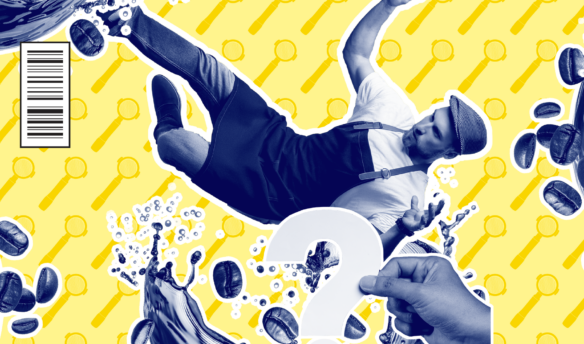Welcome to The Coffee Human Resource column.
Throughout my career, I’ve been an eternal critical optimist: I see the issues holding back our industry but fundamentally believe we have the power to make things better—something I’ve seen and been part of firsthand.
I’ve had the privilege of collaborating with some of my favorite people to test out creative solutions to industry issues. For example, I helped run Glitter Cat Barista, a platform and resource bank, and we worked with over 100 coffee professionals and enthusiasts of marginalized identities to change the competitive coffee landscape.
I worked with two of my longtime colleagues to start Ghost Town Oats, an oat milk brand that challenged the largely cishet white male narrative of oat milk. We crowdfunded our business, making hundreds of coffee professionals stakeholders in the fast-growing oat milk category. I’ve witnessed my generation of coffee professionals find a terrific balance between being highly outspoken and action-oriented. They’ve forced me and many others to get uncomfortable, and we’re better off for it.
Much of the work I’ve been proud to do has focused on community building and increasing representation, and I’ve loved it all. The work I’ve done has often felt like painting houses. There’s tremendous joy in splashing bold and vibrant colors on the exteriors of homes surrounded by duller, greyer, homogenous structures.
Although I’ve been in coffee for 16 years, over the past four years, I’ve realized that I’m much more interested in the foundations of these houses. As a business owner, I know what it’s like to have to temporarily patch up structural issues while dealing with fires, floods, and all manner of compounding disasters. I relish the opportunity to build strongly from the ground up or retrofit structures to reinforce the house and have it last for decades.
It’s become clear to me how I can best serve a coffee community full of houses that need structural support: by devoting myself to human resources. I believe that taking a targeted approach to human resources is essential in the responsible building and scaling of coffee businesses.
Throughout my career, I’ve been an eternal critical optimist: I see the issues holding back our industry but fundamentally believe we have the power to make things better—something I’ve seen and been part of firsthand.
In 2020, I started my HR deep dive. I got certified as an Associate Professional in Human Resources. Since I’ve been certified, I’ve consulted for coffee businesses of many different sizes and taught workplace safety classes. My client-based work digs deep into handbooks, policies, compensation, succession planning, and conflict management. I continue to do coursework for additional certifications, which will allow me to provide even more specialized HR services.
So today, as an introduction to this column, I’m here to make the case for why you should think about human resources for your coffee business whether you’re opening up your fifth location or just getting started.
No Longer Operating on Vibes
The case for investing in human resources becomes evident considering the current labor landscape of retail coffee in the United States. Retail businesses across all sectors, including coffee, are understaffed and turnover is high. Instagram accounts dedicated to exposing workplace harm and inequities proliferate. Unionization pushes have exploded since the onset of the COVID-19 pandemic.
These public airings of grievances have laid bare widespread systemic workplace issues. They’ve also given us highly organized and thoughtfully presented blueprints for the basic needs of the retail coffee workforce through union-run Instagram accounts and press interviews. We can see from these countless examples that the calls almost always come from inside the house. Every coffee business, no matter what size, needs to be thinking about human resources.
It makes sense that HR isn’t at the top of most business owners’ minds. Every small coffee business owner I’ve ever met often has to approach things like culture building and setting employee standards by winging it, especially in the beginning. Most business owners usually start with similar intentions: serve great coffee to their community without necessarily thinking about employee wellness, interpersonal communication, conflict resolution, or labor laws.
They’re often operating on vibes. Perhaps they’ve provided their neighborhoods with something new and exciting. They’ve maybe been lucky enough to find a great staff that makes their shop feel like a second home for their customers. Against many odds, their new business just seems to work. Sometimes, the vibes are so resonant that they feel they have no choice but to duplicate those vibes as a business scales, changes, or opens a second, third, and fourth location.
The duplication of vibes is often mistaken for creating a company culture. It simply cannot account for the complexity of human interactions and needs as a business matures.
Whether scaling up or expanding the scope of a solo shop, retail coffee businesses need strong people policies. This is not just some well-wishing proposition for running a kinder company. An engaged workforce is more productive and makes higher sales. Unhappy workers leave for better opportunities, and the quantifiable turnover costs are higher than you think. In the transparent information age, you may think that what goes on between you and your employees is fully behind closed doors, but your internal employer brand will often affect your external customer-facing brand, for better or worse.
The duplication of vibes is often mistaken for creating a company culture. It simply cannot account for the complexity of human interactions and needs as a business matures.
Investing in HR isn’t just good for workers; it’s also crucial for founders. Committing to great people policies early on or at any stage of running a small coffee business can go a long way toward improving mental health outcomes for founders, who are more prone to having mental health issues.
I want coffee businesses to be better places to work for hourly and salaried employees and easier places for business owners to operate. Rather than think of human resources as cumbersome or unnecessary, I think it’s a tool that gives clarity and shape to workplaces and ultimately results in more engaged workers and less burdened employers.
This ongoing column will explore the issues within the issues, addressing topics such as de-escalation tactics, financial transparency, radical candor, and the evolving needs of a diverse workforce. The aim here will be to demystify important workplace issues and invite critical discussions on what makes coffee businesses better.
And I intend to make this fun! I’m a voracious consumer of books, music, television, and film. Popular culture gives us countless opportunities to learn from human behavior and think critically about how we function (or don’t!) in workplaces. In addition to relevant research, you can look forward to accompanying analyses of “Survivor,” Sarah MacLachlan, nunsploitation films, and queer pop music.
I want you to start thinking about human resources for your coffee business and not be afraid to engage with these topics. I hope you’ll join me here, on Instagram, and on LinkedIn to contribute to a long overdue discussion for retail coffee businesses. I invite you to approach these topics with curiosity, a critical eye, and a good sense of humor. Through turns thoughtful, adventurous, and, at times, silly, I believe we can exchange innovative ideas that will improve the industry we love.














